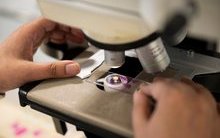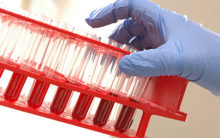Responding to the cancer workforce plan, announced to coincide with the Britain Against Cancer conference. Professor Jo Martin, President of The Royal College of Pathologists said:
‘One in two of us will develop cancer at some point in our lives and more of us will live with the long-term effects of cancer and its treatment. Pathology is the definitive diagnostic service for cancer and plays an important role in cancer prevention, early detection, treatment and monitoring. It is facing a critical stage in recruitment and retention.
‘Earlier detection improves the chance of successful treatment, saves lives and leads to a better quality of life for a person living with cancer, and is more cost-effective for the NHS. Pathologists are key to this. Year-on-year there is an increase in demand for pathology services, in the number, sophistication and complexity of tests performed to deliver the best cancer therapies
‘We look forward to shaping the next stage of planning with Health Education England to ensure the pathology workforce is able to continue supporting patients with cancer. We will work closely with our biomedical and clinical scientist colleagues and are pleased to see the contribution of other pathology specialties is recognised in the plan.
‘Digital pathology offers real benefits to patients and pathologists alike by enabling the rapid referral of cases between health trusts or across pathology networks to improve access to expert advice and opinion on diagnoses. The benefits of digital pathology are needed now and, whilst implementing and developing this innovation has a short term cost, the long term gain will result in considerable savings for the NHS.
‘Our expertise is central to the care and treatment of patients with cancer. With the right support we can ensure our expertise is available to all who need it.“
Ends
Notes to editors
- Pathologists and scientists are at the heart of cancer screening, diagnosis, monitoring and treatment. Pathology is the service that handles the cells and tissues removed from suspicious ‘lumps and bumps’, identifies the nature of the abnormality and, if malignant, provides evidence to the clinician on the type of cancer, its grade and, for some cancers, its responsiveness to certain treatments.
- There is an approaching retirement crisis: a quarter of all staff in post (histopathology) are aged 55 years or more, with a third (36%) of these aged 60 years or more. It can take up to 15 years to train a pathologist.
- The NHS target (set out in the Cancer Taskforce strategy report in 2015) is for a definitive cancer diagnosis for 95% of patients within four weeks by 2020.
- Digital pathology improves laboratory workflow and connectivity and increases flexibility and efficiency of the workforce, helping create digital training resources that support the development of specialists in training. However, pathology departments are currently under pressure with under staffing, increasing workload and reconfigurations. Investment is needed in infrastructure including IT systems (an estimated figure of £2-4m for a large hospital), staffing and training a cohort of pathologists to be expert in digital pathology, similar to efforts to increase skills in molecular pathology to deliver the 100,000 genomes project.
- The College has agreed a high level strategy for the implementation of diagnostic digital pathology that outlines: the advantages and limitations of digital pathology in diagnosis; the need for a coordinated approach to the use of digital pathology in training, examinations and service delivery; and a proposal for the national coordination of advice and guidance for those using, or intending to develop, digital pathology.
- Cancer Research UK’s report Testing Times to come? An evaluation of pathology capacity across the UK, November 2016 highlighted that, year on year, the amount of histopathology requests received by each laboratory has been going up by around 4.5% on average.
- Cancer Research UK commissioned their research to understand the pressures facing pathology services across the UK and to identify solutions to address these issues.
- It found increased demand for pathology services due to higher cancer incidence, a growing complexity of referrals and requests, and introduction of initiatives to increase earlier cancer diagnosis. Cellular pathology, blood sciences and molecular pathology all experienced an increase in activity in recent years. Each specialty also experienced difficulties in staffing their services. Based on the number of pathologists currently in training and the age profile of the current workforce, the CRUK study found there is likely to be a severe crisis in pathology capacity within the next five to ten years.







